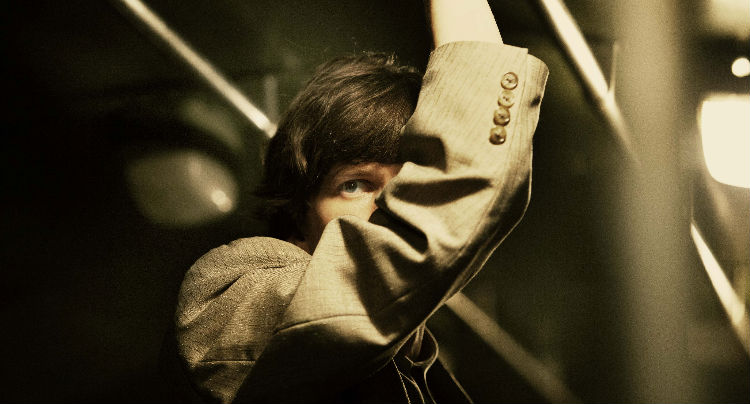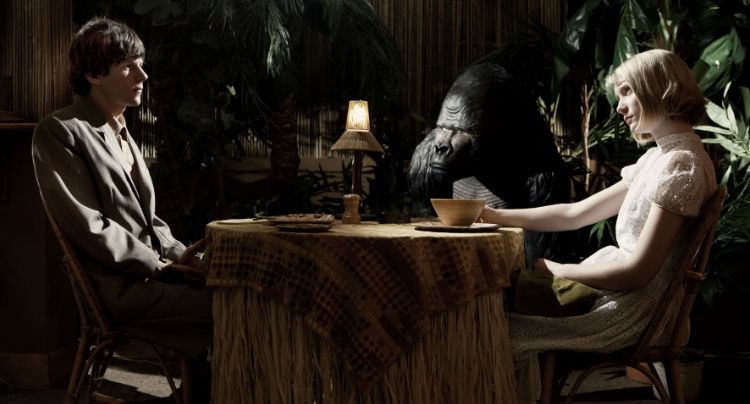
A familiar story, but Ayoade makes us feel like we're watching it in a small, dark room, tripping on hardcore drugs.

A familiar story, but Ayoade makes us feel like we're watching it in a small, dark room, tripping on hardcore drugs.
A few years ago, Jesse Eisenberg was regarded by many (especially in the mainstream) as a less famous alternative to Michael Cera, the other squeaky-voiced, wimpy white kid taking over theaters nationwide. They’re both naturally likable and unassuming, and they embody awkward better than almost anyone else. Recently, however, Eisenberg has emerged as the more well-rounded, powerful performer of the two, exhibiting an ability to draw audiences in with his piercing, thoughtful gaze and pulling ahead of Cera in both popularity and cinephile cred. He’s proven he can elicit both laughs and gasps, and that versatility is put to the test in The Double, a stylish Dostoyevsky adaptation by Submarine director Richard Ayoade in which the young actor is tasked with portraying two radically different fellows who (as the film’s title indicates) look identical.

Simon, the film’s frail protagonist, is a hard-working office drone and total pushover. He’s utterly unremarkable in every way, to the point where his colleagues struggle to remember his name and the security guard at the entrance sternly insists he sign in as a visitor, despite the fact that he’s worked there for seven years. “Seven years…” he pitifully protests, almost inaudibly. No one cares. No one sees him. He’s trampled on by everyone and everything because his spine is made of Jell-O.
On the other side of the spectrum in every regard is James, a cocky new hire who the other workers (particularly of the opposite sex) worship almost immediately. Simon’s ignorant, dismissive boss Mr. Papadopoulos, played by Wallace Shawn doing his typical Wallace Shawn thing, is thrilled with James’ “work” (which he makes Simon do for him like an elementary school bully would), and insists that Simon is slacking and should be more like him. The role of James, like Eisenberg’s turn in The Social Network, allows him to tap into the enigmatic, articulate, dominating side of his persona that earned him the iconic role of Lex Luthor in Batman Vs Superman. He’s small in stature, yet positively menacing due to his formidable intellect and capacity to use it as a lethal weapon.
The world Ayoade and his crew have built around Simon and his nemesis resembles a steampunk version of Brazil, with flashes of George Orwell, Orson Welles, and David Lynch influence strewn throughout. The sets are darkly imaginative and slightly magical, and Ayoade invites us to drink up the luscious, shadowy imagery with him. He relishes photographing his bronze dystopia, with its typewriters, old-fashioned diners, telescopes, and endless dark corridors. The film is bathed in a sickly yellow light, which is unsightly at first but earns its welcome when you realize it provides a visual density and richness.
As a corporate satire, the story is simple but expressionistic, never allowing us to plant our feet firmly in the realm of reality. This type of alter-ego tale is unquestionably familiar (though it hasn’t ever lost its potency in cinema), but Ayoade mixes in so many trippy substances that it gives the formula a fresh coat of sludgy black paint. A glaring issue is that Simon is so completely hopeless and sad that it’s hard to attach to him, or at least it’s uncomfortable to. There’s an emotional distance to the film that persists to the very end.

We get our first good look at Simon’s angel-blonde office crush Hannah (Mia Wasikowska) bathed in the heavenly blue light of a giant humming printer (very Lynchian). She, like everyone else, has no idea who Simon is, but she takes a quick liking to the confident, fun James, who exploits Simon’s inferiority complex to get closer to Hannah. “I know what it feels like to be lost and lonely and invisible,” he confesses to James, a sentiment the sneaky devil uses to steal Hannah’s heart. Everyone…hell, the entire universe seems to be conspiring to make Simon’s life miserable, and he feels worthless. How will he take his career, his dream girl…his identity back? “I exist!” he cries in desperation in a crowded room of staggered co-workers.
Simon and James play perfectly to Eisenberg’s strengths, and he proves again why he’s one of the most seasoned young stars in the industry. His scenes with himself are improbably the film’s most engaging, though that’s not to discount his excellent supporting cast. The film is very funny, though that probably won’t be everyone’s ultimate takeaway. The “everyone hates Simon” gags are hilarious, timed and edited perfectly for comedic effect. (An early bit in which Simon makes a feeble attempt to move past two men on his way out of a subway car is sublime). The refined humor will probably get lost in all the drippy atmosphere and heightened style, but whether that’s an issue or not depends upon your expectations.